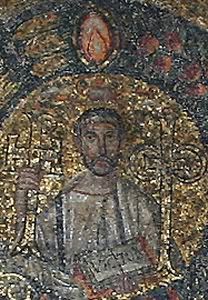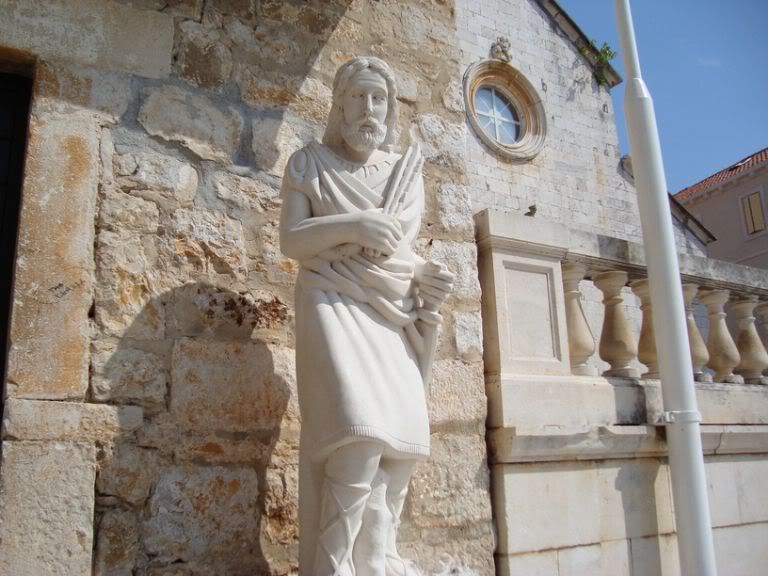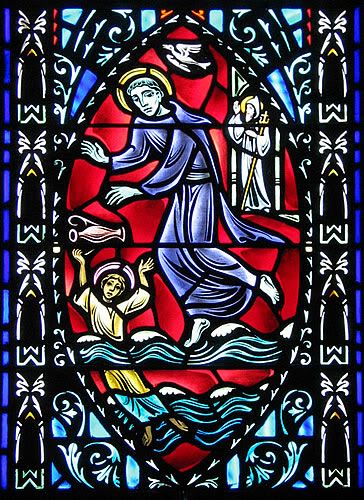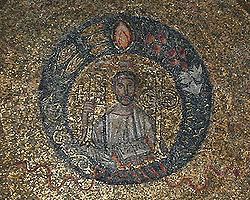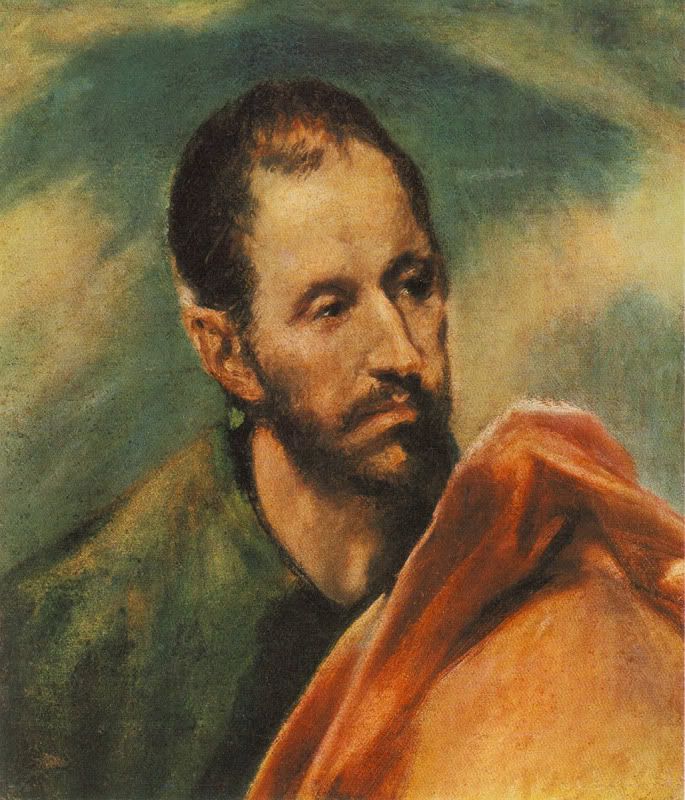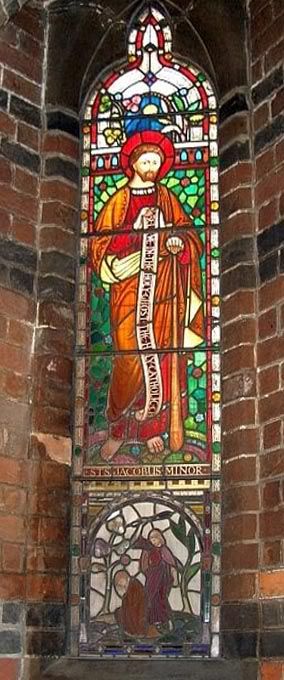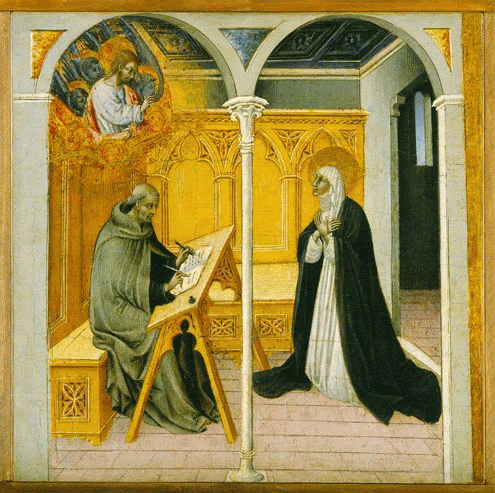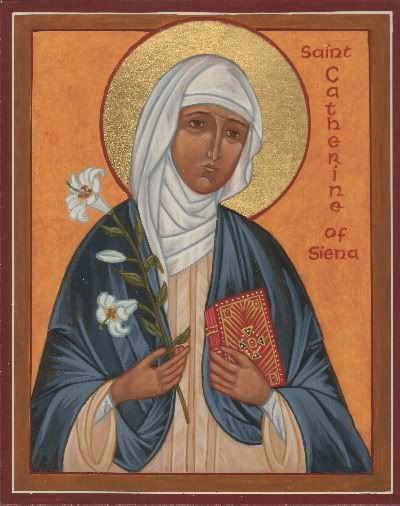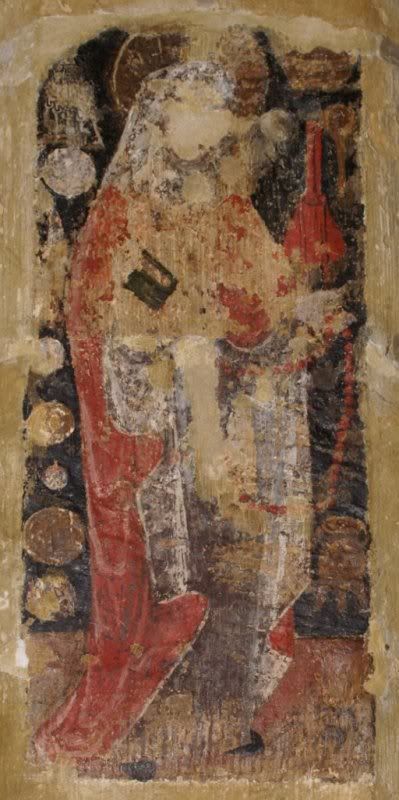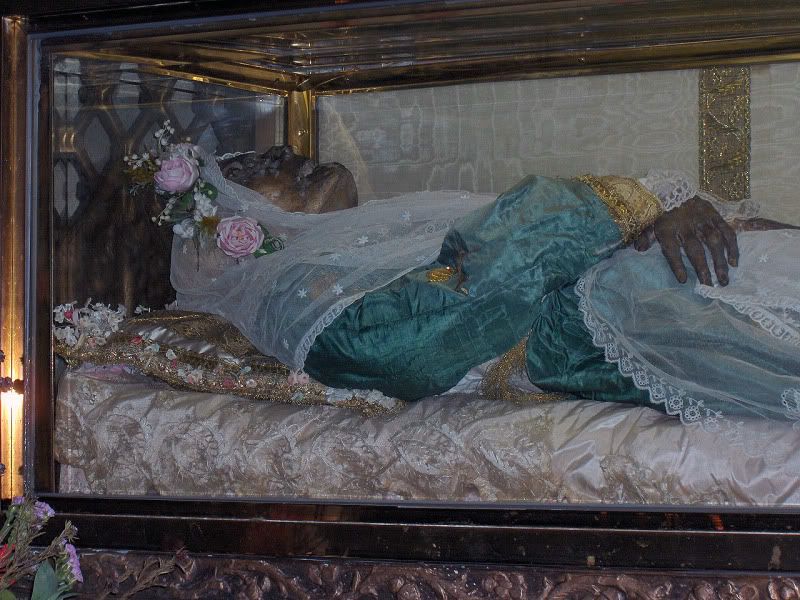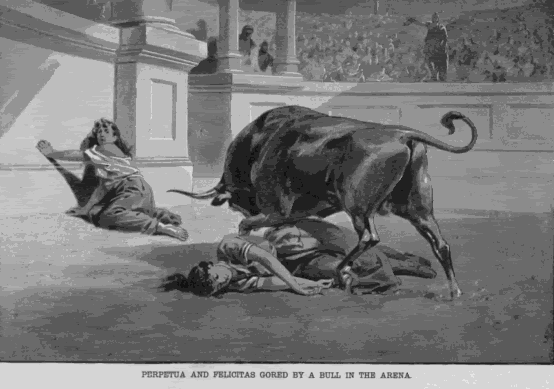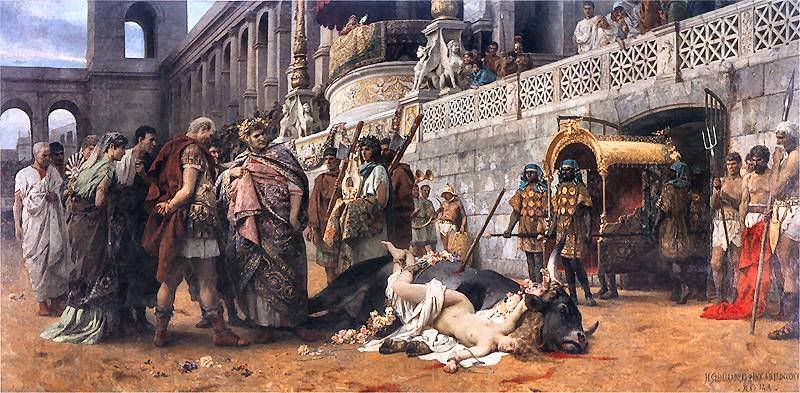Saint Victor was born and raised in Mauretania in a Christian household. He is reported to have served in the Roman Army throughout his life, likely as a praetorian guard. Though he was a practicing Christian throughout the time of persecution, he was not discovered until late in life, when he is believed to have been quite elderly, following his destruction of several pagan alters. As his passion describes, he was arrested, brutally tortured—including being basted with molten lead—imprisoned, and eventually decaptitated for his faith. Throughout, he steadfastly refused to sacrifice to pagan gods, asserting his belief in the one true faith—a faith he was happy to confess he had practiced since his youth, stating: "I certainly am a Christian, and I adore Jesus Christ the Son of the Living God who was born of the Virgin Mary. I believe in my heart, and I never stop praising him with my mouth."
The Emperor, Maximianus, knew Victor, as he had served long in the guard. He gave him every opportunity to recant his faith, hoping that torture would at long last convince him. In the midst of his pain—being stretched on the rack, beaten, having molten lead poured on his body—Victor held true to his belief in Christ. He stated, "Christ is my salvation and my strength. I am nourished by the spirit of him who I have received into my body." The Emperor, not giving up, offered Saint Victor status and riches, should he sacrifice to the pagan gods, similar to the temptations of Jesus by the Devil in the desert. Victor replied, "All the gods of the nations are demons, but our God made the heavens: if, therefore, they are called demons from the start, how will I worship them? I have already said, and will say it again: I will not sacrifice to the demons but I offer myself as a sacrifice of praise to God: because it is written ‘everyone who sacrifices to demons and not to God willbe destroyed.’ I do not accept the rewards promised by you, but I accept strength from my God every day."
Unable to convince him, Victor was beheaded on May 8. The local bishop received permission to bury the body, which remained guarded by wild beasts for 6 days until he could retrieve it. Later a church was erected over his grave. According to St. Gregory of Tours, many miracles occurred at the shrine. In 1576, Victor's relics were transferred to a new church in Milan established by the Olivetan monks. The church still bears Saint Victor's name today.
The life of Saint Victor Maurus is remarkable in its simplicity. He was a lay person—a soldier—who held fast to his faith throughout his life, during a time of growing distrust and eventual persecution of Christians. His death, in contrast, is remarkable for its solidarity with heaven. Saint Victor, at the end of his days, did not fear torture and death, but welcomed it willingly as a testament to his faith and confidence in the Lord. He endured six days of inhuman pain, never losing sight of the glory of God and the love and grace of Our Blessed Mother. His steadfast faith reminds us of how easily distracted we are today, in our own lives, from our faith by seemingly trivial matters. Imagine our response to torture and pain for our beliefs, for the Lord. How might we incorporate Saint Victor Maurus’ single-minded focus on Christ into our daily lives?
The Passion of St. Victor
1. When the impious Maximianus was ruling as emperor there was a great persecution of Christians in the city of Milan. There was there a certain soldier by the name of Victor, Moorish by race, who was very well known to the emperor. Then his ministers made a report to the emperor saying, "O Most Clement Lord and Emperor, Victor the Moor has become a Christian and blasphemes against our gods, saying that they are demons. The emperor was angered and ordered that Victor be brought before him; and he said to him, "Victor my soldier, what do you think that you are lacking that you have become a Christian?" Victor responded, "I have not become a Christian just recently, but have been one since my youth." The emperor Maximianus said, "You are a Christian, then, so you clearly say?" Victor replied, "I certainly am a Christian, and I adore Jesus Christ the Son of the Living God who was born of the Virgin Mary. I believe in my heart, and I never stop praising him with my mouth." Then the emperor Maximianus was filled with anger and ordered that he be thrown into the prison which was near the Circus and on the route to the Ticinese Gate, and that he be closely guarded, saying to him, "Go Victor, think to yourself how you can escape those terrible tortures which will viciously rip you unless you offer sacrifice". Thus he was sent to prison and spent six days there, and the emperor ordered that neither bread nor water were to be given to him. On the seventh day the emperor Maximianus ordered a platform to be readied for him in the hippodrome of the Circus, and that Saint Victor be brought to him. He said to him, "What is it, Victor, what have you decided about your salvation?" Saint Victor replied, "Christ is my salvation and my strength. I am nourished by the spirit of him who I have received into my body."
2. Then the emperor Maximianus was filled with anger and ordered that clubs be brought, and that Victor be stretched out in his sight and beaten. He commanded that the torturers should go beyond the third mark of the rack, and should shout at him, "Sacrifice to the Gods whom the emperor and everyone worship." When Victor had been beaten the emperor ordered that he be set up straight, and said to him, "Victor, hear my advice, yield to and serve those gods: because no-one can better serve them than you, especially since you are distinguished by your grey hairs". Saint Victor replied, "Blessed David, king and prophet, teaches, "All the gods of the nations are demons, but our God made the heavens: if, therefore, they are called demons from the start, how will I worship them?" Then the emperor Maximianus said to him, "Behold I give to you the rank of magister militum, much gold and silver, retinues and property, only sacrifice to the gods whom we worship". Victor replied, "I have already said, and will say it again: I will not sacrifice to the demons but I offer myself as a sacrifice of praise to God: because it is written "everyone who sacrifices to demons and not to God will be destroyed."" The emperor's consiliarius Anolinus said, "Victor, rewards have been promised to you by the most clement emperor: why don't you sacrifice to the gods whom the emperor adores, those to whom he bows his neck?" Saint Victor replied, "I do not accept the rewards promised by you, but I accept strength from my God every- day."
3. Then, angered, the emperor Maximianus ordered that he be thrown into prison again, the prison near the Roman Gate. When he was there for three days the emperor ordered that he be brought forth from the prison, and said to him, "Victor, sacrifice to those gods whose real divinity proves them to be gods". Saint Victor replied, "I do not sacrifice to the gods of the pagans: for it would be shameful for me to desert what I learned in the sanctification of my baptism, even if in a situation of necessity and under the compulsion of an evil man, you. I will not. Do what you will do, for I know that he who fights on my behalf is stronger than you." Then the emperor Maximianus and his Consiliarius Anolinus ordered clubs to be brought, and Victor to be stretched out. They ordered that the torturers should go beyond the fifth mark of the rack, and should shout at him, "Sacrifice to the gods whom the emperor and everyone worship." Then Saint Victor, although he was in the middle of his punishment, did not show any feeling of pain but prayed thus to the Lord, saying, "Lord Jesus Christ by whose bread I am nourished today, my king and my God, help me in the midst of these tortures." Then the emperor Maximianus said to him, "Victor, take thought for your life and sacrifice to the gods whom all adore. For I swear by the gods, by my welfare and by the government of the state, that unless you sacrifice through various punishments I will make you breathe your last breath. And do not hope that if you are punished by me that the Christians will make my servant one of their martyrs: for I will order that you be flung where your body will never be found." Saint Victor replied, "I am not sacrificing: do what seems best to you: you will not make a servant of yours breathe his last as you said, but a servant of Christ." Then the emperor Maximianus, angered because Victor had replied in this manner, ordered that he be thrown into the prison near the Roman Gate again, and that his legs be stretched apart on a slab.
4. When Victor had been let out from there, the Consiliarius Anolinus sent messengers to him saying, "Go and say to Victor "Fellow, you have badly given up hope of your life, take thought for your safety, and do not further provoke your emperor to anger. Hear my advice, sacrifice to our gods and seek from the emperor whatever honour you wish: for by the gods and the welfare of the emperor you are readying many torments for yourself."" Saint Victor said to those who came to him, "Go and tell Anolinus. I do not sacrifice to the gods of the pagans because scripture teaches us that all those who worship idols and glory in their statues will be destroyed. I worship the living and true God that I may live forever." When this had been reported to Anolinus it was reported to the emperor also. Both were extremely angry. On the next day the emperor Maximianus ordered him to be led out of prison, and Anolinus said to him, "Is your heart so stubborn that you will not listen to the commands of the emperor and sacrifice?" Saint Victor replied, "I do not sacrifice to gods which are unclean and senseless. "Then the emperor ordered that all kinds of instruments of torture be brought before him, and he said to him, "Do you see, Victor, what great torments await you if you do not sacrifice?" Saint Victor replied, "Those torments which you wish to inflict upon me are nothing: but greater torments will be prepared for you by my god on the day of righteous judgement." Then the emperor Maximianus, taking it badly that Victor had openly insulted him, ordered lead to be brought forward, melted, and poured over the whole of Victor's body. And when he was being covered in this way, Victor prayed thus to the Lord, saying, "O Lord Jesus Christ, for whose name I endure these things, help me and free me, just as you freed unharmed the three boys from the midst of the burning furnace, and confounded the tyrant: send an aide now in that manner, and free your servant to the embarrassment of Maximianus and his lackeys." And there immediately appeared an angel of the Lord who made the lead as cold as springwater and it did not burn any part of Victor's body. Then, stretching out his hands, Blessed Victor gave thanks to the Lord, saying, "I thank you, Jesus Christ, Son of the Living God, that you deigned to pity your servant, and sent your holy angel who cooled the lead and soothed with the ointment of your mercy the wounds which the wicked Maximianus inflicted upon me." Then Maximianus and all those who were present were amazed that Victor's body had not been burned. Then Saint Victor said, "I thank you, Lord God, Father of Our Lord Jesus Christ, you who cooled the lead and enabled me to overcome the terrible tortures; do not allow me, I beg you, to be overcome by those men."
5. Then the emperor Maximianus ordered that he be led to the Vercelline Gate: and while they awaited the emperor's commands they paused there. Then the soldiers who were guarding Saint Victor fell asleep, and rising Victor fled and hid himself in a stable in front of the theatre. Then the soldiers rose and pursued him, and finding a lone woman they questioned her, asking, "Did you not see a white-haired man with torn clothing come this way?" The woman replied, and said, "I did see a white-haired man with torn clothing flee this way." Then the soldiers continued their pursuit along the road which was named after the stables, and they arrived in front of the theatre; and entering the stables they found Saint Victor hidden in front of the horses. Then the soldiers assaulted him and brought him outside. When Maximianus heard that Victor had fled he was furious with his soldiers, and he ordered other soldiers to take them outside the city to a place called the Garden of Philippus. The emperor himself strolled about in the hippodrome of the circus, and sent runners to Victor, saying "Go and tell Victor "you have despaired for your life, and you are not willing to offer sacrifice: by the gods, if you do not sacrifice I will sentence you to capital punishment."" To these Victor replied, "Go and tell your emperor "do quickly what you are about to do because I want to receive my reward from God, the reward for which I suffer these things, and because it is time: if it should please him who has given me my soul and spirit."" Then the emperor Maximianus ordered his servants to be called, and he told them that Victor was to be led to a small wood named The Elms, where he the emperor had a garden, and that he was to be beheaded there. And when Saint Victor was being brought there, he said to the soldiers who were bringing him, "Tell the emperor Maximianus that he will die this year, and that when he is dead no grave will accept him unless his legs are broken." When he had said these things they reached the place, and Victor made a speech, saying, "I thank you, Lord Jesus Christ, that you have not separated me from your saints, my fellow citizens, Nabor and Felix. I bless and thank you forever. Amen." When the speech was complete his head was cut off by a servant.
6. Then the emperor ordered that no one should bury his body in order that it might be eaten by the wild animals. And after six days the emperor sent his quaestor with soldiers in order to see if it had been eaten by the beasts and serpents. They went and found Victor's body intact, in no part damaged, and two beasts guarding it, one at his head and the other at his feet. They returned and reported to the emperor. Then the emperor ordered that the body should be buried. After permission had been given to bury the martyr the saintly and most blessed bishop Maternus went for it, and found two beasts, one guarding his head and the other guarding his feet. The body itself was as it had been left at the very hour of execution. But the beasts, when they saw the saintly bishop Maternus, gave way; as long as they had stood there the body had been protected. Maternus wrapped the corpse in linen, brought it not far from the little wood, and buried it in peace. Then Anolinus the consiliarius ordered all the exceptores in the palace to beseized, and made them swear by their gods that if any of them had any written record no one would conceal it. Then they all swore by the gods and by the safety of the emperor that no one would conceal such, and all the papers were brought forward, and Anolinus had them burned before him by a servant. This greatly pleased the emperor. Saint Victor was beheaded on 8 May, and buried by the bishop Saint Maternus on 14 May, during the reign of Our Lord Jesus Christ with the Father and the Holy Spirit, forever and ever. Amen. (Act. Sanct. Mai II, 288-90)







